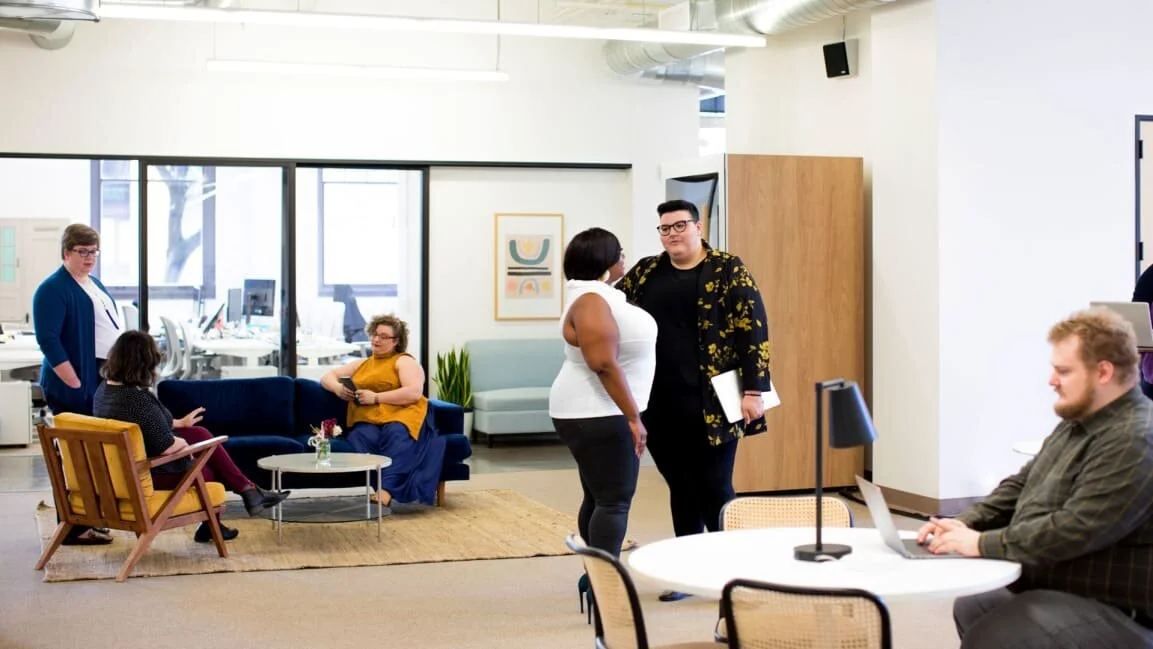It is hard to focus on work and do your best when you can’t actually fit in your office chair. When most organizations think about diversity and inclusion, they usually don’t think: “How do we make sure our employees fit comfortably in their chairs so they can perform at their highest level?” Yet as 71% of the country (and 30% of the world) is labeled as overweight or obese according to the CDC, companies need to start considering the implications that their seating options have on their employees.
Eloquii, a Walmart-owned retailer for women who wear sizes 14-28, did just this. Not only is this good for Eloquii’s employees but happier employees are more likely to be more productive and drive better business outcomes. According to one study, happy employees can be up to 20% more productive than unhappy ones.
Eloquii has always been in touch with their customers and actively solicits their feedback. The company applies this mindset to their employees as well. Not only do they want their employees to enjoy their work–they also want them to feel comfortable while they are working.
In order to ensure optimal employee experience, they surveyed their staff to gain feedback across a variety of workplace facets. Some of the key feedback included requests for more ergonomic chairs that would allow associates to feel more comfortable in the workplace. Eloquii looked into various seating options, particularly chairs with wider widths for its associates across both HQ offices.
To more easily source these chairs, they partnered with Walmart’s sourcing team in order to identify Herman Miller chairs with adjustable armrests. They told me employee feedback has been overwhelmingly positive.
I am excited about the example Eloquii is setting for other companies. Furthermore, Walmart, Eloquii’s parent company, also has strategies in place to help larger-bodied employees find more comfortable chairs. A Walmart spokesperson said,
“Walmart is proud to offer our associates a simple process by which they can request a workplace job adjustment, such as a larger chair. In addition, we provide a centralized intake process for reasonable accommodation requests under the Americans with Disabilities Act for our associates with disabilities. We routinely fulfill thousands of associate requests every year and regularly use surveys and other methods to seek feedback from associates on how to improve their work environment.”
To better serve its larger-bodied customers, Walmart currently features Big & Tall office chairs. However, I believe Walmart has a larger business opportunity to provide supportive and comfortable seating options to the larger-bodied customers who shop at the stores not only for their homes but also for their offices. The office furniture market was listed as $15.5 billion dollars in 2019 and is continuing to grow.
Employers should adopt Eloquii’s example and learn how to better understand the needs of their employees. Although few and far between, there are consultancies popping up that help companies address how to design office space for larger-bodied workers.
One such organization is AllGo. Founded by Rebecca Alexander, who also founded a Yelp-like app that goes by the same name, it aims to help higher-weight people “rate the comfort and accessibility of public spaces so others can know what to expect.” According to Alexander, “Great companies know that good employee morale is critical to their company’s success. For plus-size employees, it is demoralizing to arrive to work every day to chairs that leave bruises on your hips.” Bathrooms designed so poorly that they have just as much space as an airplane is another issue Alexander often sees. “Happy employees are a company’s best asset. And there are lots of great, easy-to-implement, and inexpensive ways to motivate and reward plus-size people,” she explains, “It can be as simple as talking to them. You just have to know the right questions to ask.”

